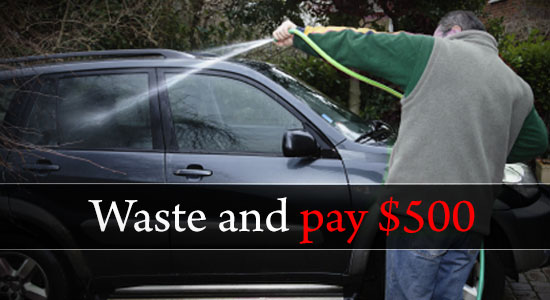Residents who waste water on lawns, car washing, landscapes, running fountains, etc, would have to pay a fine of $500 in California. This new law has been passed by the California water regulators after it was found in a recent report that water consumption has increased amidst the worst drought seen in almost 4 decades.
The state water regulators voted on July 15,2014 and passed the new law for water preservation. The State Water Resources Control Board adopted the new regulation that empowers local agencies to penalize residents (who waste water) up to $500 a day. Moreover, police will have the power to ticket water-wasters.
The Chairwoman of State Water Resources Control Board Felicia Marcus was ecstatic with the 4-0 win. She said, “Our goal here is to light a fire under those who aren't yet taking the drought seriously”. She is very happy with the result since this kind of step has never been taken before in California. Moreover, this step would spread the burden of conserving water amidst the 3-year dry spell amongst people who are not directly involved in protecting wildlife. According to Felicia Marcus, city and suburban people have not yet realized the seriousness of the situation, and this is really unfortunate. Several communities are on the verge of running out of water in the state. Therefore, Marcus can't be labelled as over bearing when she says, “this is the least that urban Californians can do."
The new law will be effective from early August 2014. It is not that every citizen (who violates the law) would have to pay $500. Repeat violators may have to pay the full fine. Others may get respite with only smaller penalties and warnings.
The law is exempted for public health and safety. This includes cleaning of sidewalks to wipe out human waste left by people without any roof above their heads.
The State Water Quality Control Board took this action after they conducted a survey on water conservation. The result of the survey showed that the previous measures to conserve water have failed to attain a 20% reduction in water loss. Rather, the overall consumption of water in the state has increased by 1% in May 2014, in comparison to the same month in 2013 and other years.
Penalties will be imposed upon those residents who indulge into wasteful outdoor watering. This includes watering lawns, cleaning a car without a nozzle in the hose, overflowing the hard surfaces like sideways and driveways.
Huge agricultural water loss due to the worst draught in California
The drought in California has lead to agricultural water loss in the state. Central Valley firms have been tremendously affected due to less river water. As per a report published by University of California-Davis(UC-Davis), the water level has dropped by 1/3rd and this has significantly affected the area. Nearly 80% of the state is facing extreme draught conditions. Reservoirs are very low too. Moreover, almost 50 communities may run out of water at anytime.
According to the report of the U.S Drought Monitor, almost 36% of the state is in drought. The total revenue losses in the agricultural sector has been $1 and half billion, which is about 3% of California's agricultural value. The only reason why the agriculture sector has not collapsed is because of the groundwater reserves. However, it would be a fatal mistake to consider the groundwater reserve as the 'unlimited savings account'.
Economical impact of the draught
As per the UC-Davis report, there will be a huge economical impact of the draught in California. The key findings of the report suggest that there will be a direct loss of 17,000 jobs (both seasonal and part-time) due to draught. The drought is expected to continue in the next year too irrespective of whether the climate pattern EI Nino develops. This may provide the required rain and snow in the coming winter.
Food price is likely to stay unaffected. Higher cost of the crops like grapes, dairy foods, nuts, wine, etc, is primarily driven by the market demand rather than by the draught.
Alternative options if the new step doesn't work
Marcus is hopeful that the new law would help to reduce water wastage. But what if the new law doesn't help to bring the desired result? Well, Marcus is ready to face that situation too. If the new law fails to force Californians to save water, then the State Water Quality Control Board would consider taking other steps such as asking water districts to fix leaks in their pipes and save 10% of water and introducing severe landscape rules. Other than these steps, the board would also request water agencies to hike rates for people who use more water than they're supposed to.









